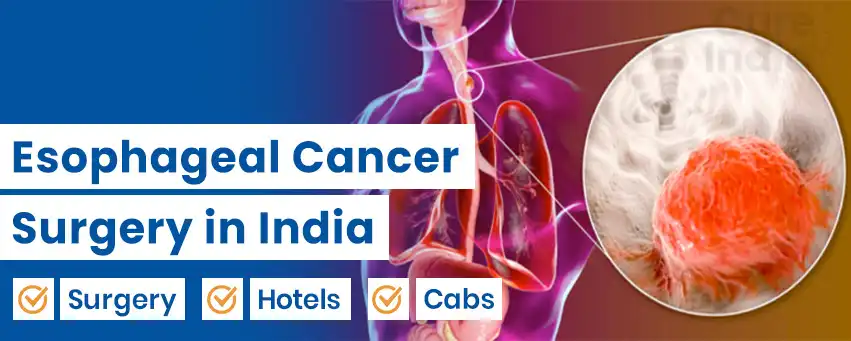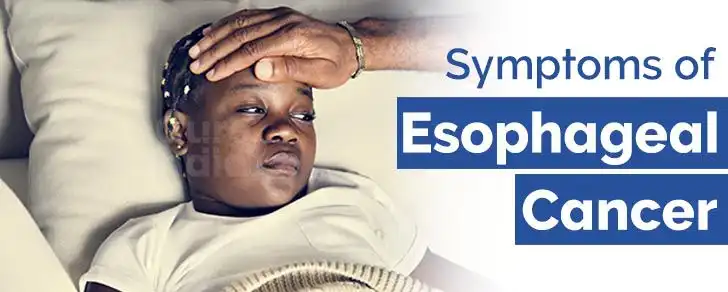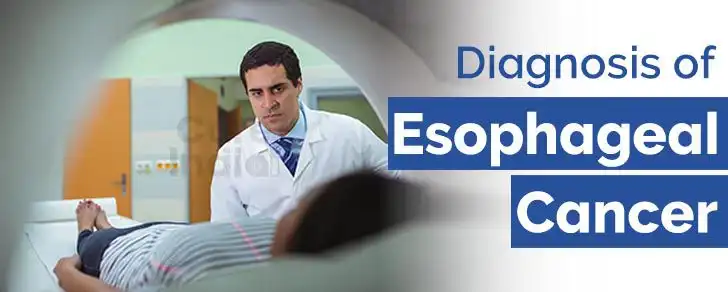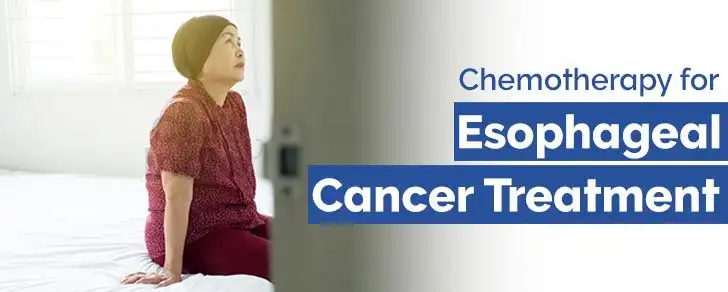

The cancer that develops in the esophagus is known as esophageal cancer (EC). An esophagus is a hollow, muscular tube that connects the throat to the stomach. It is commonly known as a food pipe. It is a part of a body’s digestive system and its function is to carry the food from the mouth to the stomach. It lies behind the trachea which is commonly known as a windpipe. On the top of the esophagus is a muscle ring known as the upper esophageal sphincter.
Cancer in the esophagus occurs when there is a mutation in the cells that line the esophagus. The cancer starts in the inner layer of the esophagus which can then spread to the other layers of the esophagus and sometimes, it can also spread to the other organs of the body through connective tissues. The mutation in the esophageal lining cells can occur due to the consumption of alcohol and tobacco products, unhealthy eating habits, excessive weight gain, etc.
Cancer of the esophagus (EC) is the eighth most common cancer worldwide and it is one of the leading causes of mortality and morbidity caused by cancer on the globe. It accounts for 604.000 cases in a year and it is the sixth leading cause of mortality caused by cancer with 544,000 deaths every year. Most of the EC cases are reported in low-middle-income countries, about 80% of EC cases occur in these countries. Eastern Africa is considered one of the geographic hot spots of EC. In Eastern Africa, EC is the fifth leading cause of death caused by cancer. In sub-Saharan Africa, about 90% of EC cases are diagnosed at an early stage due to insufficiency of the healthcare system to provide an early diagnosis.
Studies show that the cases of EC are higher in Zambia. Many times it happens that the patients go to the healthcare provider when they have an early stage of cancer. But because the condition is asymptomatic, the correct diagnosis is not made and when the right diagnosis is made, the cancer has already reached an advanced stage that leads to poor prognosis. Studies show that the causes of the EC in African countries are smoking, exposure to PAHs (Polycyclic Aromatic Hydrocarbon), obesity, exposure to carcinogenic contaminants, etc. Due to the lack of early diagnosis and sufficient treatment protocols, many Africans from countries like Kenya, Zambia, Tanzania, and Ethiopia visit India to receive the right diagnosis and treatment protocols. Cancer treatment in India is affordable and top-quality, performed by experienced surgeons with high success rates.
Esophagus cancer is classified by its extent, spread, and the kind of cells that are involved in the cancer. There are two major types of esophageal cancer which are squamous cell carcinoma and adenocarcinoma. Besides these two there are other types also but they are rare. The different esophagus cancer types are mentioned below.
This is a type of cancer that occurs in the flat and thin cells known as squamous cells that line the esophagus. It can occur in any part of the esophagus but it mostly affects the upper half of the esophagus. Esophageal squamous cell carcinoma can occur due to genetic mutations in the squamous cells which makes the cells grow and multiply uncontrollably. The exact cause of these mutations is unknown but the specialists reported that it may be linked to heavy consumption of alcohol and tobacco products.
It is the most common type of cancer that develops in the esophagus. It mostly occurs in the lower portion of the esophagus. It is a cancer that affects the mucus gland cells present in the esophagus. These mucus gland cells transform to squamous cells which is common in people who suffer from gastrointestinal reflux disease known as Barrett’s esophagus. This disease causes the mucus gland cells to become mutated and transform into squamous cells. The adenocarcinoma occurs due to overexposure of the esophagus to the stomach acid. Many times the adenocarcinoma occurs in the area where the stomach connects to the esophagus commonly known as gastroesophageal junction. The exact cause of adenocarcinoma is unknown. However, specialists reported that it is commonly caused in people who have persistent acid reflux conditions, who are obese, etc.
It is a rare type of cancer of the esophagus. It develops in the neuroendocrine cells which release the hormones into the bloodstream as a response to the nerve's signals. Some other rare esophagus cancer types include lymphoma, choriocarcinoma, melanoma, and small-cell carcinoma.
The stage of the cancer helps us understand the extent of the cancer, how big it is, and whether it has spread elsewhere in the body. The most common staging system for the cancer of the esophagus is called TNM which stands for Tumor, Node, and Metastasis. However, simply and understandably, the different stages of this cancer are described below.
■ Stage 1 esophageal cancer: It means that the cancer is present in the muscle wall of the esophagus and has not spread elsewhere.
■ Stage 2 esophageal cancer: It means that the cancer might have spread to the outer layer of the esophagus and it might also have spread to the lymph nodes that are present in the surrounding.
■ Stage 3 esophageal cancer: When cancer has spread to the outer layer of the esophagus, the surrounding tissues, and multiple lymph nodes, it is known as stage 3 cancer.
■ Stage 4 esophageal cancer: stage 4 is an advanced stage of cancer in which cancer has spread to the outer layer of the esophagus, the surrounding lymph nodes, surrounding tissues, and the distant organs like the liver, bones, lungs, etc. through the connective tissues such as the lymphatic system, bloodstream, etc.
The cancer in the esophagus occurs when the cells that line the esophagus become mutated (develops a change in its DNA). The normal DNA of the cell determines how much a cell will grow, divide, and live. The DNA contains information about how a cell functions, and it causes the timely death of the cell once it has fulfilled its duty in the body. But when the mutation occurs in the DNA of a normal cell, it is no longer a normal cell, it is now a mutated cell that contains altered DNA. This DNA contains the oncogenes which makes the cell grow and multiply uncontrollably without dying and hence it forms a mass of cells which we call a tumor. These cells are called cancer cells.
Now the exact cause of why these cells become mutated is not known. However, the experts believe that the EC is more common in people who have a habit of smoking or drinking alcohol, who are obese, following an unhealthy lifestyle, who frequently have acid reflux disease, etc. Some factors which are the leading cause of EC are as follows:
There are carcinogens present in tobacco products. Carcinogens are the compounds that are responsible for causing cancer. These carcinogens damage the healthy normal cells in the esophageal lining and make them undergo mutation due to which they become cancerous.
People who drink a lot have a higher risk of developing esophagus cancer. The risk is even higher in people who smoke and drink. What alcohol does is, it is broken down during the metabolism and forms the compounds known as acetaldehyde. The acetaldehyde is known to damage the DNA of a healthy cell and cause the mutation which develops cancer.
It is commonly known as acid reflux disease in which the acid of the stomach which aids digestion, flows backward into the esophagus. This can cause irritation and inflammation in the esophagus. If this condition persists for a longer duration, then it can turn into a condition known as Barrett esophagus which is a precancerous stage of cancer.
It is a condition in which the flat squamous cells that line the esophagus are damaged by the stomach’s acid and become red and thick. This causes damage in the DNA of these cells which then becomes mutated and hence causes cancer.
You must be wondering how excess weight can cause cancer. Well, what happens is, the excess body fat causes a rise in hormones, particularly growth hormones. These hormones are responsible for the growth of the cells. The excess production of GH makes the cells grow rapidly which can form a cancer.
The cancer can be caused when we have overexposure to the carcinogens. These carcinogens can be present in our surroundings. You can develop cancer if you have overexposure to the compounds such as benzene, asbestos, radon, vinyl chloride, trichloroethylene, arsenic, etc.
Well, unhealthy eating can not only cause cancer, but it weakens the immune system which is an important part of our body. It helps our body to fight against infections. Unhealthy eating, eating too fast, consuming too hot or too cold food and drinks, etc. can increase the chance of developing EC.
If you have undergone radiation therapy previously on the upper portion of your abdomen for conditions such as breast cancer or lung cancer, lymphoma, or any other cancer, then it can cause damage in the nearby area. This damage can form cancer.

The esophageal cancer symptoms can be unnoticeable during the early stage of cancer, and it may show the symptoms when the cancer reaches an advanced stage. It is very important to catch the cancer at an early stage because as it progresses and reaches an advanced stage, it requires rigorous treatments. Many times, esophageal cancer symptoms are mistaken for other medical conditions in low-middle income countries, which results in wrong diagnosis followed by wrong treatment and hence it develops into an advanced stage. So it is very important to receive an early and correct diagnosis, and treatment. You should consult your doctor immediately if you are experiencing the following symptoms.
You can get in touch with the best esophageal cancer doctors in India through CureIndia. The doctors at CureIndia are skilled at diagnosing and treating esophageal cancer. The treatment plans include surgery, chemotherapy, radiation therapy, and targeted therapies. CureIndia offers complete care, including free consultations, advanced treatment options, and ongoing support as you get better. Let's listen to what the best esophageal cancer doctors in India have to say:





When you tell the symptoms you are having, your doctor will check your medical history, your overall health, and sometimes your family history. Your doctor will also run a blood test and imaging tests such as an X-ray. Following are the details of different diagnostic techniques for esophageal carcinoma.
In this diagnostic procedure, your doctor will ask the patient to swallow the barium-based solution and the doctor will watch how the solution is passing through the patient’s esophagus with the help of an X-ray. This procedure is also known as an esophagram. The barium solution coats the lining of the esophagus which shows any abnormal tissue presence under an x-ray.
In this procedure, the doctor passes a thin, flexible tube known as an endoscope that has a lighting device and a camera attached to it through the mouth into the esophagus of a patient. The endoscope helps the doctor to visualize the esophagus of the patient. Sometimes, the tissue sample of the patient’s esophagus is collected during this procedure which is then sent to the laboratory for testing.
Biopsy is the diagnostic procedure in which the tissue sample from the patient’s esophagus is collected and then it is sent to the laboratory for testing. The pathologist in the lab will examine this tissue under the microscope to check for any presence of abnormal tissues and cancerous or precancerous cells. The procedure is performed in a similar way to the endoscopy.
The other diagnostic techniques include the imaging tests such as Ultrasound, CT Scans, MRI Scans, PET Scans, etc. These are the techniques that create the images from different angles of the patient’s esophagus and merge the images to form a detailed and 3D image of the patient’s esophagus. The doctor then uses this image to examine the inner lining of a patient’s esophagus.
CT Scans use X-rays, MRI Scans use magnetic fields, and PET Scans use dye which is injected into the patient’s vein. This dye deposits at the sites where the cancer is present in the body. The patient’s body is then scanned under the PET scanning machine which will show the highlighted parts of the body where the dye is present.
The type of treatment that your doctor recommends for the cure for esophageal cancer depends on the stage and grade of the cancer, whether it has spread to any other organs of the body, how big the tumor has formed, the patient’s overall health, and age. The different types of treatments available in India for the cancer of the esophagus are as follows:
Surgery is a choice of treatment if the cancer is localized, meaning that it is present in the esophagus itself and has not spread beyond the esophagus. It is a preferred treatment for the early stage of cancer. The surgery is done to remove the cancerous tissues and tumors from the esophagus before it starts to spread to the nearby tissues and the other distant organs in the body.
Most of the time, along with the tumor, some of the surrounding healthy tissues are also removed to prevent any chances of cancer spreading. Sometimes the part of the esophagus is removed to remove the cancer tissues. The surgery to remove a part of or an entire esophagus is known as esophagectomy. There are different types of surgery for removing the cancer tissues which are mentioned below.
■ Surgery to remove the small tumors: Sometimes, when the cancer is present in only the superficial layers of the esophagus and has not spread elsewhere, a surgeon may only remove the margin of healthy tissues around the cancerous tissues. This surgery is performed endoscopically.
■ Surgery to remove a part of the esophagus: This surgery is known as esophagectomy. It is a surgical procedure that is used to remove the part of the esophagus that is damaged and contains cancer. Sometimes the surrounding lymph nodes and a small portion of the upper stomach are also removed during this procedure. The remaining esophagus is then connected to the stomach.
■ Surgery to remove part of the esophagus and part of the stomach: This surgery is known as esophagogastrectomy. In this surgical procedure, the part of the esophagus is removed along with the surrounding lymph nodes and a major part of the upper stomach. The remaining part of the esophagus and stomach is then connected with each other.
The surgery is performed either laparoscopically where a few small cuts in the chest are required or with the open technique where the large cut is made on the chest to open up and reach the esophagus to perform the surgery. The patient will be given anesthesia during the surgery to make them unconscious so that they don’t feel any pain.

Chemotherapy is a drug-mediated cancer treatment. This treatment technique uses the medicines that are given to the patients via an intravenous infusion. Sometimes, the chemotherapy drugs are given in the form of pills. Most of the time the chemotherapy is combined with surgery. If the chemotherapy is given before the surgery, it is known as neoadjuvant and if it is given after the surgery, then it is known as an adjuvant. The medicines used in this treatment technique target the cancer cells, stop them from growing, and destroy them. Sometimes it is also combined with radiation therapy.
Radiation therapy uses high-energy beams of protons and X-rays to destroy cancer cells. It is also known as external beam radiation when the radiation is applied from the outside of the body with the radiation machine. Sometimes, the radiation is applied to the cancerous tissues and tumors internally by inserting the small radiation application device through the mouth, it is known as brachytherapy. In many cases, the radiation therapy is combined with the chemotherapy. Radiation therapy is usually given to the patient before the surgery and it is mostly a chosen treatment procedure for patients who have advanced-stage cancer.
The targeted therapy is also a drug-mediated cancer treatment in which specially designed drugs are given to the patients which identifies and targets the cancer cells and destroys them. The esophagus cancer cells contain a high amount of HER2 protein. This protein is specific to cancer cells and it is not present in the normal healthy cells. What this protein does is, protect the cancer cells from our body’s immunity and facilitate the growth of the cancer cells. The targeted therapy drugs are designed in a way that they target these HER2 proteins and destroy the cells that contain this protein.
The function of the immune system is to identify the abnormal cells in the body and destroy them, if not done so, the abnormal cells can develop cancer. When the normal cells develop a mutation in their DNA, it becomes cancerous. The cancer cells contain the mutated DNA that uses the checkpoint proteins to hide from the immune cells. Immunotherapy drugs are checkpoint inhibitors that target the checkpoint proteins of the cancer cells and make them visible to our immune cells. These immune cells will then kill/destroy the cancer cells. There are many types of checkpoint inhibitor drugs such as PD-1 inhibitors, CTLA-4 inhibitors, etc.
With the completion of the treatment for the cancer of the esophageal lining, it is important to keep track of the overall health to ensure the cancer is not coming back. Normally, the cancer can reoccur within the first 2 to 3 years after the treatment. So, your doctor will give you follow-up appointments every 3 to 6 months for about 2 to 3 years, and then every 6 to 12 months for the next 3 years, and then once every year.
During these appointment visits, your doctor will check your overall health, may or may not run the blood test, and will run an X-ray to check if there is any slight presence of cancer cells. You must ask any queries you have during these appointments and inform any symptoms you are having to your doctor.
You must follow healthy and balanced lifestyle habits such as regular physical activities, clean and nutritious eating habits, getting proper sleep and rest, and other lifestyle choices. This will facilitate fast healing and even make the immune system stronger than before. A healthy immune system will make sure that the body stays free from infections and cancer.
If you had surgery to remove part of the esophagus or the stomach, then you will have the tubes and drains attached to you when you wake up after the effects of anesthesia wear off. The tubes are attached to give you the fluids and medicines through the veins and the drains are attached to drain out the fluids that might be released from the surgical site and one drain is used to drain out the urine from the urinary bladder. You will have a bandage applied to your chest if the open surgery is used.
When you are discharged from the hospital after the surgery, your doctor will give you some instructions on how to take care of the surgical wound, when and how medicines you should take, when to come for a follow-up session, etc. The recovery after the surgery will take about 3 to 6 weeks and the complete recovery can extend up to 8 weeks, it varies from patient to patient.
The total cost of the cancer treatment is influenced by many factors such as the chosen hospital, location, patient’s overall health, stage of cancer, type of cancer, the planned treatment, oncologist’s expertise, medication cost, travel cost, diagnostic cost, insurance coverage, etc.
However, on average, the cost of esophageal cancer in India can range between $3,000 to $5,000. The cost of the same treatment in the USA ranges from $100,000 to $500,000 and in the UK, it ranges from $19,110 to $25,500. It depends on how long the treatment is and what stage of cancer a patient has. The list of different treatments for esophagus cancer are listed below.
| Treatment Name | Cost in India | Stay in India |
|---|---|---|
| Esophageal Cancer Treatment in India | $3,500 - $5,000 | 10-15 Days |
As you can see in the list that has been mentioned above, the cost of the treatment is very low. India has become a hub for cancer treatments due to highly skilled doctors and world-class treatment procedures at very cost-effective prices. The Indian nation has become a beacon of hope for international cancer patients due to the affordability of treatment procedures for a wide range of diseases. India has world-renowned oncologists and top-tier cancer hospitals that are devoted to providing optimum and best medical care for their patients.
The cancer of the esophagus is the 8th most common cancer in the world with the highest number of cases reported in low and middle-income countries. In some African countries like Zambia, it is the leading cause of death caused by cancer. This is due to insufficient medical care availability and unawareness of the patients about cancer symptoms. Most of the cancer cases in these countries are detected at an advanced stage due to poor diagnostic tools and a shortage of cancer specialists. Because of this reason, a lot of African people visit India for affordable and correct diagnosis protocols followed by the right treatment procedures. India has become a medical hub with a wide range of premium medical treatments at low costs. International patients choose India over other countries because they receive world-class medical care at a very profitable cost.
